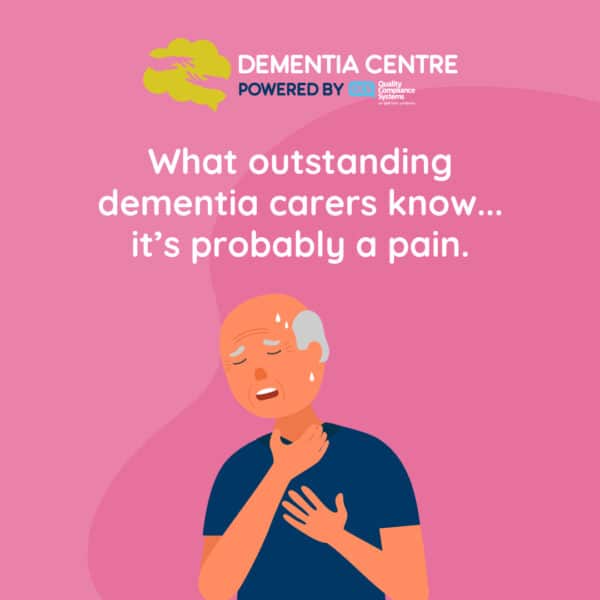What is your pain behaviour? Did you realise that we have different ways of expressing our pain dependent on several factors including our personality, previous experience and learned behaviours? Add to that the specific circumstance in our current pain moment, including physical, social and emotional influences and you can see how complex a pain response can be. Some of us will become very quiet and withdrawn whereas others will become very vocal about our experience. Some of us will pace to relieve the pain and some of us might even get angry, doors might be slammed and cross words exchanged.
If you are providing a care service, it can be very useful to talk to the service user’s family and care partners to discover what their usual pain behaviour is so that you can be alert for it and investigate further if that individual begins to behave in that way. Could you include this detail in your care plans?
But also, consider a person who is living with dementia and how their specific cognitive difficulties might impact on their usual expression of pain. People with dementia can experience a range of cognitive symptoms. For example, a difficulty with finding the right words or being unable to use spoken language can mean that the person cannot articulate their pain to you in any other way than through their behaviour or by vocalising their pain through sounds such as groaning or moaning.
Or perhaps the pain information processing system is the area that is damaged by the condition causing the dementia? This is known as nociception and processes information about actual tissue damage that is relayed to the brain. If the brain area is damaged then the processing of this information will be compromised and the person might not be able to pinpoint the site of the pain, or may not even be aware that the body tissue has been damaged.
There are, of course, many other potential sources of pain, in addition to a direct wound. Many people who are living with dementia are more at risk of experiencing some of these pain-inducing conditions than those who are more able to live well and healthily. If the person is not following a healthy diet or drinking sufficient fluids, they are more at risk of constipation. When constipation becomes chronic, it can lead to increasing pain and internal problems. Likewise, if the person is not drinking well, they can develop urinary tract infections (UTIs) and experience the resulting pain.
A person living with dementia who is finding it difficult to complete the executive functions of planning and sequencing a task, problem solving and recognition of task completion will have difficulty with many everyday activities. Not surprisingly therefore, people with dementia are often less able to complete good oral hygiene and are more prone to tooth decay and gum disease. The pain that they will then experience can affect their dining and nutrition as well as their emotional wellbeing. If they are unable to express that they have a toothache, the problem can go untreated.
Even when pain has been detected and treated, the fear of pain can remain as the person might not understand that the cause of the pain has been addressed but only hold onto the distressing memory of the situations that caused it. Imagine, if you had shoulder joint pain, how you might resist any attempt to manipulate your arms into a jumper. It is easy to see how some pain behaviours can be classed as so called ‘challenging behaviours’.
Care Quality Commission fundamental standards state that service users must have person-centred care or treatment that is tailored to and meets service users’ needs and preferences and, of course, inspectors look for evidence that individuals’ needs are being met. The QCS Pool Activity Level (PAL) Instrument is a well-respected and valid tool for identifying the level of cognitive and functional ability of an individual and provides guidance on how to support the individual given their specific level of ability.
PAL Instrument
You can access the PAL Instrument free of charge from the QCS website by following this link: https://www.qcs.co.uk/digital-pool-level-activity-pal-instrument/
Why not download the PAL and try using it to improve the experience of your service users, develop the practice of your team and evidence how the person is progressing when the pain is identified and correctly managed?
QCS Dementia Centre
The QCS Pain Management Policy and Procedure will assist staff with strategies for supporting people who experience pain. If you are supporting people who are living with dementia, you will add to your knowledge and skills by subscribing to the comprehensive resources in the QCS Dementia Centre. It not only contains the PAL Checklist but also the recently validated QCS PAL Engagement Measure. This tool will holistically identify not only the cognitive and functional abilities of the individual but also the physical, emotional and social factors that combine to illustrate how the person is faring in a specific activity, such as teeth cleaning, dining or one that encourages mobility. You can use QCS PAL Engagement Measure to monitor, review and share the progress of the person in order to evaluate your service and to celebrate best practice.
PainChek
QCS is working closely with PainChek to provide the optimum support to appropriately identify and manage pain experiences in people with dementia by harnessing the potential of technology enabled care.
Be a Pain Detective and utilise the cutting-edge resources that can help you to improve the well-being of people with dementia who you support!
More information about PainChek
Find out more about QCS Dementia Centre and request a FREE trial
We also brought you a FREE webinar, partnered with PainChek, where we discussed the challenges of assessing and managing pain for people living with cognitive impairments who cannot reliably self-report their pain.






